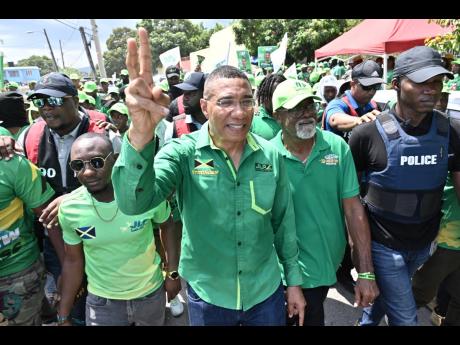Peter Espeut | A much reduced majority
Jamaica continues to be ‘The Confounding Island’ of which sociologist Orlando Patterson wrote in 2019 ( The Confounding Island: Jamaica and the Postcolonial Predicament. Harvard University Press). With more churches per square mile than any other place in the world – and more rum bars and betting shops – Jamaica has re-elected (for a third consecutive term) a prime minister under investigation for illicit enrichment.
I have not yet seen the figures on the popular vote, but the turnout was low at 39.5 per cent, only marginally better than the 37.9 per cent in the middle of the COVID-19 pandemic. Large numbers of those who voted care not about corruption. The churches – hard at work in Jamaica since the 1700s – have a lot of work to do.
It was a victory for old-style politics, with an orgy of rented crowds decked out in party colours, light poles littered with party paraphernalia, motorcades with overcrowded vehicles and body protrusions, ribbon-cutting (incomplete projects) and ground-breaking (promised projects) strangely not turning off impressionable voters.
Jamaica got the best election that money can buy! Congratulations to the private sector donors who made it all possible! What will they get in return?
REAL WINNERS
The real winners were the public relations consultants who have almost guaranteed their prosperity in future elections.
The February 2024 Local Government Elections were a wake-up call for the Jamaica Labour Party (JLP); that real-time poll showed a massive swing to the People’s National Party (PNP); in fact, the PNP won the popular vote. Had that been a general election the JLP would have lost 17 seats to hold only a one seat majority in parliament. Since then the JLP has slightly improved their position; last Wednesday they lost only 15 seats to now hold a five seat majority. The PNP failed to capitalise on the discontent clearly evident in February 2024. Maybe they did not have the money, and were simply outspent.
In the previous parliament, the JLP held a two-thirds majority in the lower house, a super-majority which promised them almost smooth sailing in overturning entrenched constitutional provisions, and installing new ones in a new Constitution. The one remaining safeguard against dictatorship of the majority was the requirement of a two-thirds majority in the upper house, only possible if one opposition senator voted with the government.
The current numbers mean that profound reforms to Jamaica’s Constitution will definitely require bi-partisan consensus in its early stages in the lower house. This is good news for Jamaica, and will mean that one side will not have things all their own way.
It also means that continuing states of emergency after the initial declaration will also require bipartisan support in its early stages.
Even though there were some policy planks of the PNP platform that favoured a pro-transparency anti-corruption agenda, if the PNP had won the election, those of us concerned about honest governance could not leave it up to them to make it happen; civil society would always have been expected to lobby hard and be vigilant watchdogs. Politicians do not give up power and the possibility of self-aggrandizement easily.
GREATER TASK
With a JLP victory, the task of civil society including the Church is all the greater. The investigations by the Integrity Commission (IC) and the Financial Investigations Division (FID) into illicit enrichment by politicians and public servants cannot be allowed to wane or be discontinued. The chips must be allowed to fall where they may. Jamaica has a strong democracy, but this must be supported by strong accountability mechanisms and a strong civil society.
As difficult as it sounds at this time, civil society must insist that the hands of the IC and the FID be strengthened, not weakened. I fear that this victory in the face of strong allegations of corruption, will be taken as a mandate to deepen the opportunities for corruption, a mandate to make it harder to investigate and prosecute illicit enrichment.
If it happens, we will have only ourselves to blame.
Social media has its place, but genuine democracy requires honest and balanced traditional media. As Jamaica’s media houses give up their independence and become politically aligned, Jamaica falls in the ranking of the World Press Freedom Index. This makes the task of civil society and the church to encourage ethical governance all the harder.
Promises, promises! Higher minimum wage, lower taxes, more government spending on health and education. Many of the promises in previous manifestos were not kept. Several promises made in the heat of the just concluded street campaign are not in the JLP’s manifesto. We must give the JLP a honeymoon to rejoice in their victory, and then start to hold them accountable.
Peter Espeut is a sociologist and development scientist. Send feedback to columns@gleanerjm.com

